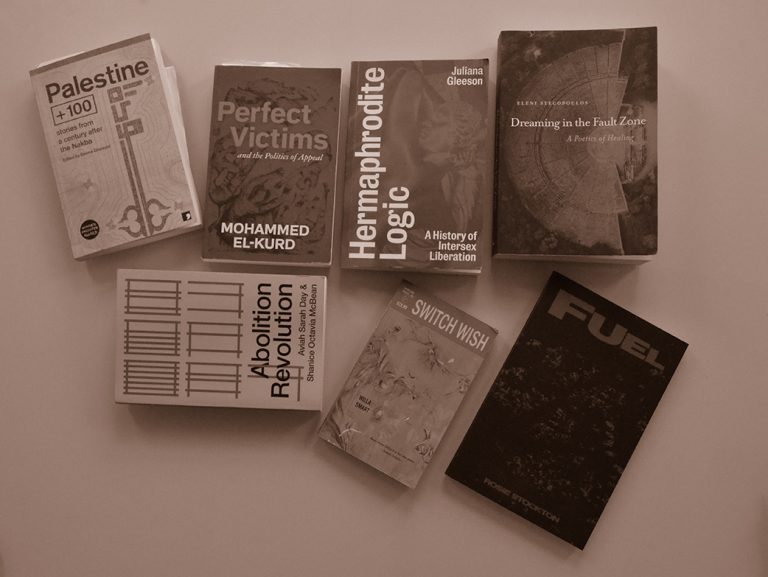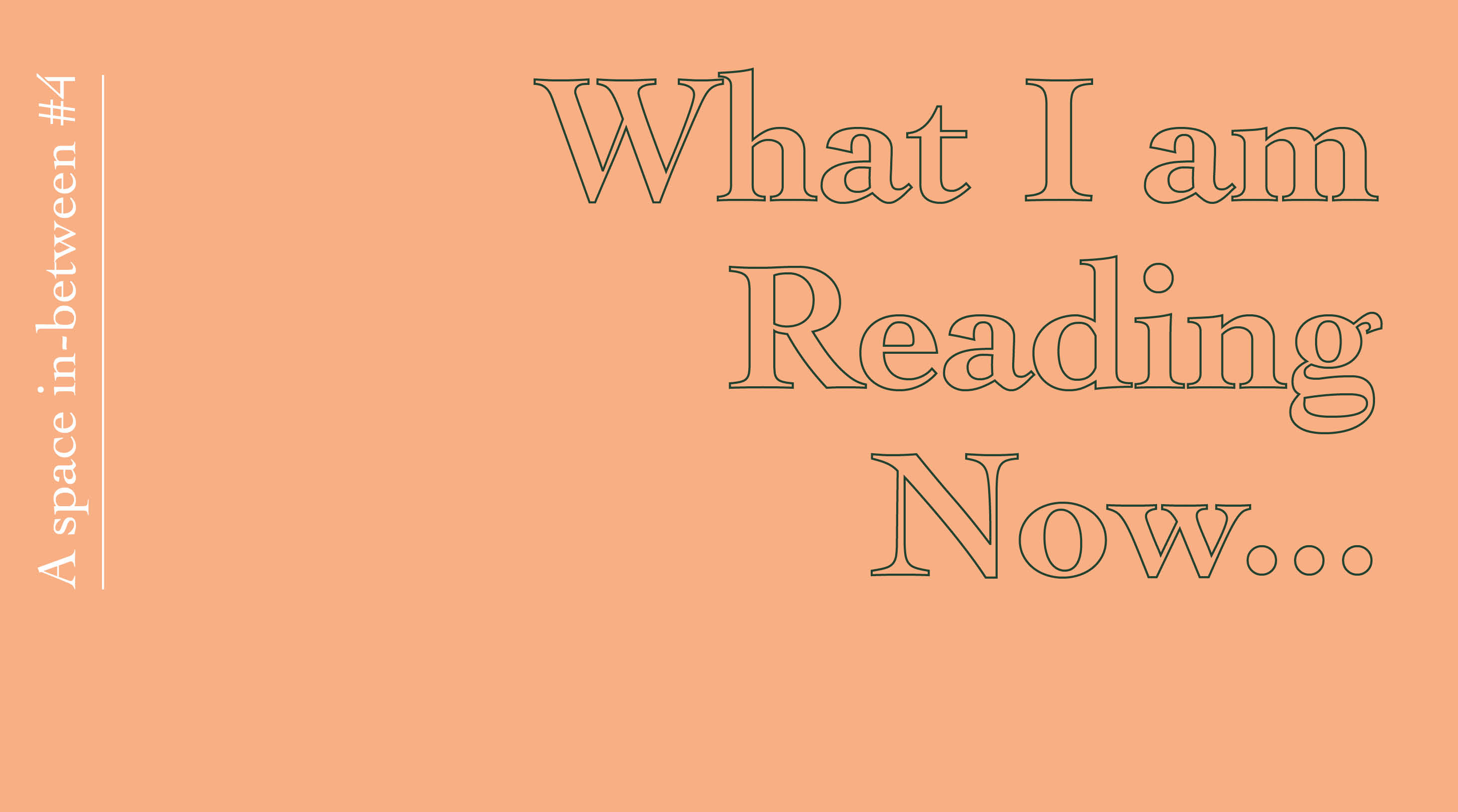What I am Reading Now…
Nat Raha
July 2025
Since late 2024, a major question animating my bodymind has been the conceptual bankruptcy of the ‘human’, given its debasement from the on-going genocide in Gaza, and the failure of the organs of liberal democracy – from supranational legal structures to nation states – to stop the genocide and end the occupation of Palestine. This conceptual bankruptcy is a moment to affirm anti-colonial and non-normative logics through other ways of living and also to reconceptualise our existence, including practices of survival, creativity, mutuality and communing — that forge worlds in the face of the social divisions and hostile environments, borders and property, coloniality and racial and gendered divisions of labour that structure our lives under capitalism; the dynamic delimiting, securing and debasing the ‘human’.
Both El-Kurd’s Perfect Victims and Gleeson’s Hermaphrodite Logic describe what it means to challenge the violence, logics and rhetoric of dehumanisation. El-Kurd extols those aimed at Palestinian lives and resistance, unpacking the terms on which Palestinians are pressured to appeal to the ‘international community’ or Western media, for justice and recognition of the violences against them. El-Kurd describes, each through a particular case of life or death, or a conversational move stuck like a thorn waiting to be removed from the discourse, how such appeals ‘defang’ Palestinians, assimilating them into an order of humanity that claims to be non-violent while enabling occupation and settler colonialism. Meanwhile, Gleeson details the shared struggles built by intersex activists and scholars through organisation and advocacy since the 1990s, which revealed the ideological and normative motives animating medical interventions upon intersex children in the USA and their longstanding harm as they had experienced. These interventions include non-consensual surgeries on the genitals of infants (which have lasting effects on their appearance, reproductive capacities, sexual sensation, and function); assimilation into a binarised gender according to surgical outcomes; and obscuring information from intersex youth and their families. Juliana elaborates how intersex activists revealed the dynamics securing a male-female, sex/gender binary, in part through clinical practices and discourses intervening in intersex bodies. A legible sex within a male-female binary is revealed as one of the conditions of the human, one that may be maintained through violence and through the dehumanisation – and pathologisation – of intersex people.
In the face of the multiple forms of dehumanisation practiced by nation states, institutionalised medical power, or by the police, practices of community solidarity, resistance and mutual aid cohere under the term abolition. Day and McBean’s Abolition Feminism is penned in the spirit of resistance following the murder of Sarah Everard by a police officer, and the death of Sarah Reed in Holloway Prison, London, following failures of care and medical neglect. I’ve been revisiting the book to remember the community practices of safety that it discusses, recent and historical, in the face of recent draconian laws and rulings against the right to protest, the right to privacy and trans existence. The book underlines the role of the police in perpetrating gendered violence, alongside the ensnarement of feminist anti-violence politics with state funding (and defunding) and charity law.
My reading practices have been – excitingly – punctuated by travel to share my two recent books, Trans Femme Futures and apparitions, reading with dozens of other writers. Standing out among this was Eleni Stecopoulos reading from Dreaming in the Fault Zone in Los Angeles. Eleni’s huge book re-encounters ancient (primarily Greek) understandings of the body, illness and recovery, in which the incubation of dreams is key. Synthesised with poetic practices of incubation, Eleni’s writing dissolves the boundaries between poetry and essay, driven by questions and desires towards practices and thought that can hold, and respond to, illness and chronic illness. Willa Smart and Rosie Stockton’s work are also recent faves, both writers using queer erotics as a method for engaging/engorging with ‘nature’/ ‘the environment’. Smart builds a phenomenological, non-sexual prose, that constructs its erotic through observation, reflection and knowingly demure eyes; Stockton’s Fuel revels in the petrochemical landscape of our everyday lives, taking a filthy, wide-eyed look at Monsieur le Capital and Madame le Terre.
If ‘all power to the imagination’ is to be more than a slogan – then envisioning the mutation of the above horrors, and resistance and alternatives to them draws me to Palestine + 100, an anthology of speculative short fiction set 100 years after the Nakba by Palestinian writers.
Dr Nat Raha is a poet and activist-scholar. She is the author of four books of poetry, including apparitions (nines) (Nightboat Books, 2024) and of sirens, body & faultlines (Boiler House Press, 2018). With Mijke van der Drift, Nat is co-author of Trans Femme Futures: Abolitionist Ethics for Transfeminist Worlds (Pluto Press, 2024) and co-editor of Radical Transfeminism zine.
Recent critical and creative writing appears in Social Text, The Brooklyn Rail, Gestures: A Body of Work, The Anarchist Review of Books and Versus Versus. Performance work includes epistolary (on carceral islands), co-commissioned by Edinburgh Art Festival, Scotland and TULCA Festival of Visual Arts, Galway, Ireland, 2023. Nat teaches in Fine Art Critical Studies at the Glasgow School of Art.
Reading
Perfect Victims and the Politics of Appeal, Mohammed El-Kurd (Haymarket Books, 2025)
Hermaphrodite Logic: A History of Intersex Liberation, Juliana Gleeson (Verso Books, 2025)
Abolition Revolution, Aviah Sarah Day & Shanice Octavia McBean (Pluto Press, 2022)
Dreaming in the Fault Zone: A Poetics of Healing, Eleni Stecopoulos (Nightboat Books, 2025)
Switch Wish, Willa Smart (Meekling Press, 2020)
Fuel, Rosie Stockton (Nightboat Books, 2025)
Palestine + 100: stories from a century after the Nakba, (Ed.) Basma Ghalayini (Comma Press, 2019)

Please note the views published in What I am Reading Now… are personal reflections of the contributors.
These may not necessarily represent the views of the University of Dundee.
Readers who wish to make a donation to support Medical Aid for Palestinians can do so here.
———
Previous Issue: Anbara Salam, June 2025
Next Issue: Karen Tam 譚嘉文, August 2025
